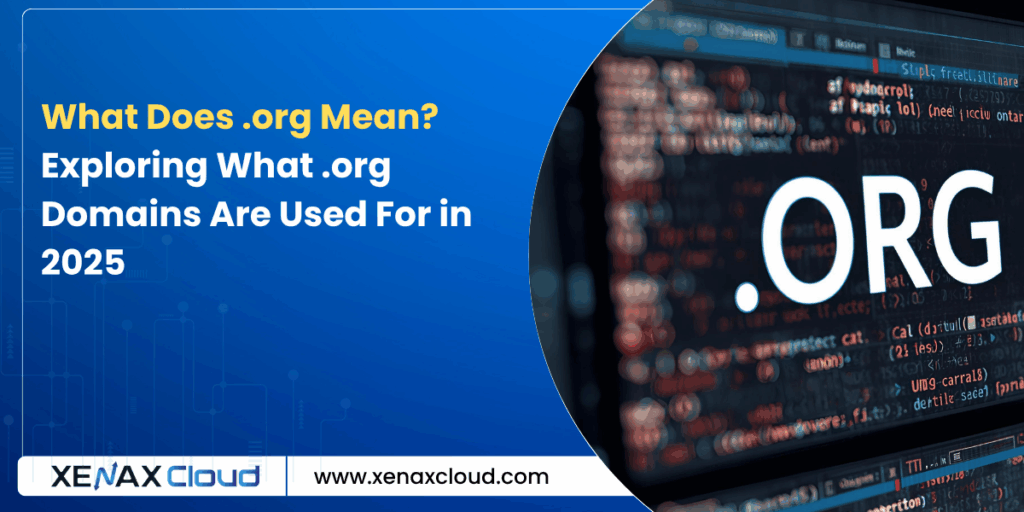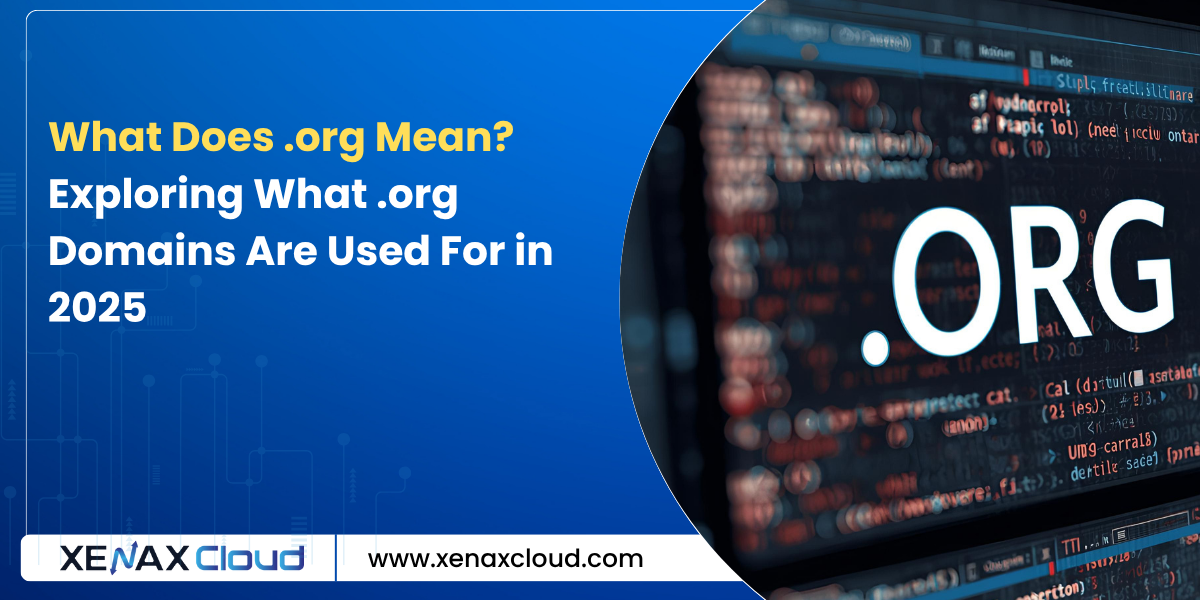Have you ever wondered what does .org mean when you see it at the end of a website address? It’s more than just three letters—it’s a symbol of trust, community, and purpose in the vast online landscape. Imagine you’re a non-profit founder in Mumbai, rallying support for a cause that spans from New York to Nairobi, or a developer in Berlin crafting open-source tools for collaborators in Tokyo and Toronto. In 2025, where digital identities drive 80% of first impressions, choosing the right domain extension like .org can make or break your visibility and credibility.
This matters profoundly for businesses, startups, and developers in India, the USA, UAE, UK, Germany, Japan, Canada, Switzerland, France, and globally because .org domains are synonymous with authenticity and non-commercial intent, helping you stand out in crowded markets. Originally for organizations, .org is now open to all, powering everything from charity sites to tech forums. In India, with over 900 million internet users, a .org domain signals reliability amid the e-commerce boom. Worldwide, it aligns with values-driven branding in ethical markets like Switzerland or innovation hubs in Japan, where trust is currency. According to recent domain reports, .org registrations grew 15% last year, reflecting its enduring appeal.
At XenaxCloud, our India-based global hosting makes registering and managing .org domains seamless, pairing them with robust infrastructure for worldwide reach. Whether you’re curious about what .org domains are used for or how to leverage them, this guide unpacks it all—from history to modern applications—helping you build a stronger online footprint. Let’s dive in and explore what is .org used for today, so you can decide if it’s right for your venture.
The Origins of .org: What Does .org Mean?
To understand what does .org mean, we need to go back to its roots. The .org top-level domain (TLD) was one of the original seven created in 1985 by the Internet Assigned Numbers Authority (IANA). Short for “organization,” it was designed for non-commercial entities like charities, educational institutions, and community groups that didn’t fit into .com (commercial) or .net (network).
In simple terms, .org was meant to represent collective efforts rather than profit-driven ones. Unlike restricted TLDs, .org has always been open to anyone, but its early adopters shaped its reputation as a hub for trustworthy, mission-focused content. Think of iconic sites like wikipedia.org or redcross.org—they embody the spirit of sharing knowledge and helping others.
For businesses in the USA launching social impact arms or developers in Germany contributing to open-source projects, knowing what does .org mean helps position your site as credible and altruistic. Today, with over 10 million .org domains registered globally, it’s evolved beyond its origins, but that core meaning of “organization” still resonates, fostering a sense of community in digital spaces.
What Are .org Domains Used For?
Now that we’ve covered what does .org mean, let’s explore what .org domains are used for in practice. While versatile, they shine in scenarios where trust and purpose take center stage. Here’s a breakdown of common applications, explained simply for non-techies.
Non-Profit Organizations and Charities
This is the classic use case—what is .org used for if not amplifying good causes? Non-profits like amnesty.org or unicef.org leverage .org to signal transparency and donor trust. In 2025, with global philanthropy hitting $500 billion, a .org domain helps charities in India (like smilefoundation.org) connect with international supporters in the UAE or Canada.
- Why It Works: Builds immediate credibility, encouraging donations.
- Global Example: French NGOs use .org for cross-border aid campaigns, reaching donors in Switzerland.
For startups in the UK focusing on social good, pairing a .org with our Shared Hosting ensures affordable, reliable uptime for fundraising pages.
Educational Institutions and Resources
What are .org domains used for in education? Plenty—sites like khanacademy.org or mit.org use them to share knowledge freely. It’s perfect for schools, universities, or online courses, emphasizing learning over commerce.
- Benefits: Enhances SEO for educational searches, drawing students worldwide.
- Regional Insight: In Japan, tech academies opt for .org to attract global learners, while Indian edtech startups use it for affordable platforms.
Developers in Germany creating tutorials? A .org domain positions your site as a go-to resource, hosted seamlessly on our VPS for interactive features.
Community Groups and Forums
From hobbyist clubs to professional networks, .org fosters community. Sites like linux.org or stackexchange.org (though .com, many similar use .org) build discussions around shared interests.
- Key Advantage: Encourages user engagement, as .org feels inclusive.
- Worldwide Use: UAE expat groups or Canadian hobby forums use .org for local-global connections.
Businesses in France building user communities? Register via our Domains and host on Reseller Hosting to manage multiple sites easily.
Open-Source Projects and Tech Initiatives
Developers love .org for its non-commercial vibe—what is .org used for in tech? Hosting project pages like apache.org or mozilla.org, where collaboration trumps profit.
- Why Popular: Signals openness, attracting contributors from India to the USA.
- Trend in 2025: With AI boom, .org domains host ethical tech discussions in Japan and Switzerland.
For global devs, our Dedicated Servers provide the power for high-traffic open-source repos.
Advocacy and Activism Sites
.org empowers voices—greenpeace.org or aclu.org rally for change.
- Impact: High trust factor amplifies messages in polarized times.
- Global Relevance: Indian environmental groups or UK human rights campaigns use .org for international solidarity.
Startups in Canada advocating sustainability? Use .org with our Indian RDP for secure remote management.
Professional Associations
Trade groups like ieee.org use .org for networking.
- Value: Positions as authoritative in industries.
- Examples: German engineering societies or French medical associations.
Advantages of Using .org Domains
Beyond what .org domains are used for, let’s discuss perks.
Builds Trust and Credibility
.org implies purpose, boosting visitor confidence—studies show 60% prefer .org for info sites.
- For Businesses: In UAE luxury markets, .org for CSR pages enhances brand image.
Improves SEO for Specific Niches
Google favors relevant TLDs—.org ranks well for non-profit searches.
- Tip: Combine with content marketing for global visibility.
Affordable and Accessible
Registrations start $10-15/year, no restrictions.
- Savings: Multi-year deals cut costs.
Our Domains make it easy.
Versatile for Branding
Short, memorable—fits any mission-driven project.
- Global Appeal: Easy recognition in non-English markets like Japan.
Potential Drawbacks of .org Domains
Not perfect—some see .org as “non-commercial,” confusing for-profit use.
- Availability: Popular names taken.
- Perception: May not suit pure e-com.
Balance with .com if needed.
How to Register a .org Domain
Simple process.
Step 1: Check Availability
Use our Domains tool.
Step 2: Choose Registrar
Opt for reliable like us.
Step 3: Complete Purchase
Add privacy, renew auto.
Step 4: Set Up Hosting
Link to Shared Hosting.
.org vs. Other TLDs: Which to Choose?
Compare:
- .com: Commercial, versatile but crowded.
- .net: Tech-focused.
- .io: Startups.
.org wins for trust.

FAQs
What does .org mean in a domain name?
What does .org mean? It’s short for “organization,” originally for non-profits but now used by anyone seeking a trustworthy, purpose-driven online identity.
What are .org domains used for primarily?
.org domains are used for non-profits, education, communities, and advocacy, signaling credibility and community focus in global digital spaces.
Can businesses use .org domains?
Yes, businesses can use .org domains for CSR, open-source projects, or branding that emphasizes values over pure commerce.
What is .org used for in tech and development?
In tech, .org is used for open-source sites, forums, and initiatives, fostering collaboration among developers worldwide.
How much do .org domains cost?
.org domains typically cost $10-15 per year, with multi-year renewals offering discounts for budget-conscious users.
Why choose .org over .com?
.org offers higher trust for non-commercial vibes, better SEO for info sites, and availability when .com is taken.
Conclusion
Understanding what does .org mean and what .org domains are used for unlocks a world of credible online opportunities. From non-profits to tech communities, it’s a versatile choice for global impact.
Ready to claim yours? Explore XenaxCloud’s Domains for easy .org registrations and pair with our hosting solutions. Contact us today—let’s build your trusted digital presence!






